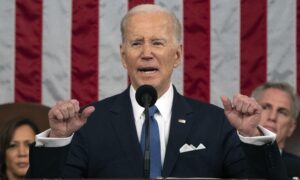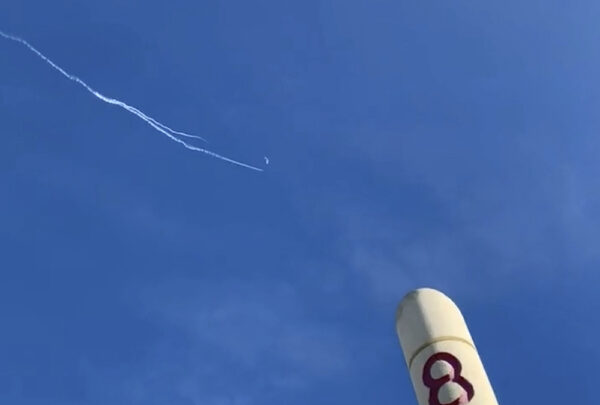Biden’s State of the Union and the Spy Balloon: More Missed Opportunities
Commentary President Joe Biden’s State of the Union speech was notable for its glancing reference to the Chinese spy balloon that drifted over parts of Canada and the United States. If you blinked, you would have missed the guarded reference to an event that captivated the nation for a week. For domestic political purposes, Biden does not want to call attention to the fiasco of the balloon floating over the country. However, what is at stake is more than a spy balloon or domestic political embarrassment. The balloon is not a single incident but needs to be understood in the context of the political warfare campaign that communist China is waging against the United States, while Washington’s response is a shadow of what it should be, if not altogether feckless. The balloon is a component of the Chinese Communist Party’s (CCP) political warfare campaign directed against the United States and its allies. No doubt, China had other objectives in launching it, such as intelligence collection, but the political warfare component is the most important. Incidents like the balloon matter, or the State of the Union address, in political warfare for three major reasons. Educate the Americans About the China Threat First, Biden could have seized the opportunity to educate the American people about the China threat as Trump did or as his Cold War predecessors from Truman to Reagan did regarding the Soviet threat. The State of the Union is a perfect venue to explain to the assembled U.S. government and the American people why the Chinese regime is the foremost external threat that the United States has faced and why it will require international but also domestic efforts to confront successfully. Biden’s address did not accomplish this, and so it is another failure to explain the threat. This is a transparent pattern with the Biden administration of not explaining why the Chinese regime is an existential threat to the United States. Planning documents, such as the “National Security Strategy” released in October last year, also fail in this regard. A U.S. Air Force fighter aircraft shoots down a Chinese spy balloon off the Carolina coast on Feb. 4, 2023. (Jason Sellers via AP) US Is Vulnerable Second, the balloon, and its antecedents sent previously over Hawaii and elsewhere over U.S. sovereign territory, reminds Americans that the U.S. homeland is vulnerable to attack by China. The Chinese regime’s balloon is a signal that Xi Jinping wanted to convey: the U.S. homeland may be physically attacked by Chinese weapons. Were kinetic warfare to come, the United States would not escape significant physical and cyber damage, and many Americans would be killed. Thus, the balloon is a political warfare attack that must be treated precisely as a Sputnik moment—the shock the foe provides to mobilize the American people—and respond to the threat China has made against Americans. The message from the Chinese regime is blunt and brutal: the CCP is signaling to Americans that it can kill them. Thus, it is incumbent to do more than shoot down the balloon—that was only the immediate first step. Of greater significance is the necessary reciprocal response from the United States. The message that must be sent is that the United States can end the rule of the CCP and its leader, Xi Jinping. Global Perception of US Leadership Third, Beijing also sent a message to global audiences: the United States is weak and cannot defend itself—indeed, the U.S. military and intelligence community might not even know that balloons previously violated its airspace impunity. That political warfare message is directed against the following audiences. First, U.S. allies as the U.S. extended deterrent depends upon U.S. credibility. There can be no doubt that the United States would employ force, including conventional war and nuclear war, if need be, to defeat an attack against a U.S. ally like Australia or Japan. To remove any doubt, U.S. power and willingness to exercise it in defense of the ally must be ironclad. The weak response to the balloon succeeded far better than Beijing might have hoped in undermining the credibility of the United States upon which all U.S. alliances depend. Thus, the balloon incident must be seen from the perspective of U.S. allies as well as of the United States, and from that point of view, the United States appears weak. Second, neutral states are influenced as well. For those states that do not want to choose between Beijing and Washington, the balloon incident is certain to be used by China to entice them to support it. Third, for enemies of the United States, the incident will encourage and embolden them regarding Beijing’s military and intelligence capabilities in contrast to those of the United States. The incident made China look like a superior military power. While that is not true, from the standpoint of political warfare, it is a victory for the CCP. The incident, coupled with reports from the House A

Commentary
President Joe Biden’s State of the Union speech was notable for its glancing reference to the Chinese spy balloon that drifted over parts of Canada and the United States. If you blinked, you would have missed the guarded reference to an event that captivated the nation for a week.
For domestic political purposes, Biden does not want to call attention to the fiasco of the balloon floating over the country. However, what is at stake is more than a spy balloon or domestic political embarrassment. The balloon is not a single incident but needs to be understood in the context of the political warfare campaign that communist China is waging against the United States, while Washington’s response is a shadow of what it should be, if not altogether feckless.
The balloon is a component of the Chinese Communist Party’s (CCP) political warfare campaign directed against the United States and its allies. No doubt, China had other objectives in launching it, such as intelligence collection, but the political warfare component is the most important.
Incidents like the balloon matter, or the State of the Union address, in political warfare for three major reasons.
Educate the Americans About the China Threat
First, Biden could have seized the opportunity to educate the American people about the China threat as Trump did or as his Cold War predecessors from Truman to Reagan did regarding the Soviet threat. The State of the Union is a perfect venue to explain to the assembled U.S. government and the American people why the Chinese regime is the foremost external threat that the United States has faced and why it will require international but also domestic efforts to confront successfully. Biden’s address did not accomplish this, and so it is another failure to explain the threat. This is a transparent pattern with the Biden administration of not explaining why the Chinese regime is an existential threat to the United States. Planning documents, such as the “National Security Strategy” released in October last year, also fail in this regard.

US Is Vulnerable
Second, the balloon, and its antecedents sent previously over Hawaii and elsewhere over U.S. sovereign territory, reminds Americans that the U.S. homeland is vulnerable to attack by China. The Chinese regime’s balloon is a signal that Xi Jinping wanted to convey: the U.S. homeland may be physically attacked by Chinese weapons.
Were kinetic warfare to come, the United States would not escape significant physical and cyber damage, and many Americans would be killed. Thus, the balloon is a political warfare attack that must be treated precisely as a Sputnik moment—the shock the foe provides to mobilize the American people—and respond to the threat China has made against Americans.
The message from the Chinese regime is blunt and brutal: the CCP is signaling to Americans that it can kill them. Thus, it is incumbent to do more than shoot down the balloon—that was only the immediate first step. Of greater significance is the necessary reciprocal response from the United States. The message that must be sent is that the United States can end the rule of the CCP and its leader, Xi Jinping.
Global Perception of US Leadership
Third, Beijing also sent a message to global audiences: the United States is weak and cannot defend itself—indeed, the U.S. military and intelligence community might not even know that balloons previously violated its airspace impunity. That political warfare message is directed against the following audiences.
First, U.S. allies as the U.S. extended deterrent depends upon U.S. credibility. There can be no doubt that the United States would employ force, including conventional war and nuclear war, if need be, to defeat an attack against a U.S. ally like Australia or Japan. To remove any doubt, U.S. power and willingness to exercise it in defense of the ally must be ironclad.
The weak response to the balloon succeeded far better than Beijing might have hoped in undermining the credibility of the United States upon which all U.S. alliances depend. Thus, the balloon incident must be seen from the perspective of U.S. allies as well as of the United States, and from that point of view, the United States appears weak.
Second, neutral states are influenced as well. For those states that do not want to choose between Beijing and Washington, the balloon incident is certain to be used by China to entice them to support it.
Third, for enemies of the United States, the incident will encourage and embolden them regarding Beijing’s military and intelligence capabilities in contrast to those of the United States. The incident made China look like a superior military power. While that is not true, from the standpoint of political warfare, it is a victory for the CCP.
The incident, coupled with reports from the House Armed Service Committee that China has surpassed the United States in the number of land-based fixed and mobile intercontinental ballistic missile (ICBM) launchers, feeds the image Beijing will promote that the United States is in decline and no longer the preeminent military power. The perception that this is true hurts the U.S. position in the world as it does the position of our allies. The reverse is true for the enemies of the United States, who will join with Beijing in touting that the East wind is prevailing over the West wind.
Washington’s strengths in political warfare are legion and far more potent than Beijing’s. But the United States fights political warfare with both hands behind its back. The Chinese regime’s atrocious human rights record, exploitation of people and the environment wherever it is present, and genocide it is committing against Muslims in Xinjiang should mean it is totally unconditionally defeated in the political realm. The fact that it is not must be immediately addressed by the Biden administration not only as a damage limited exercise in the wake of the balloon imbroglio, but as a path to victory over the CCP.
Views expressed in this article are the opinions of the author and do not necessarily reflect the views of The Epoch Times.












